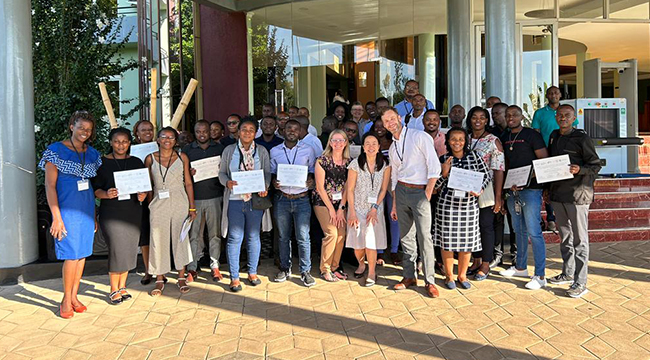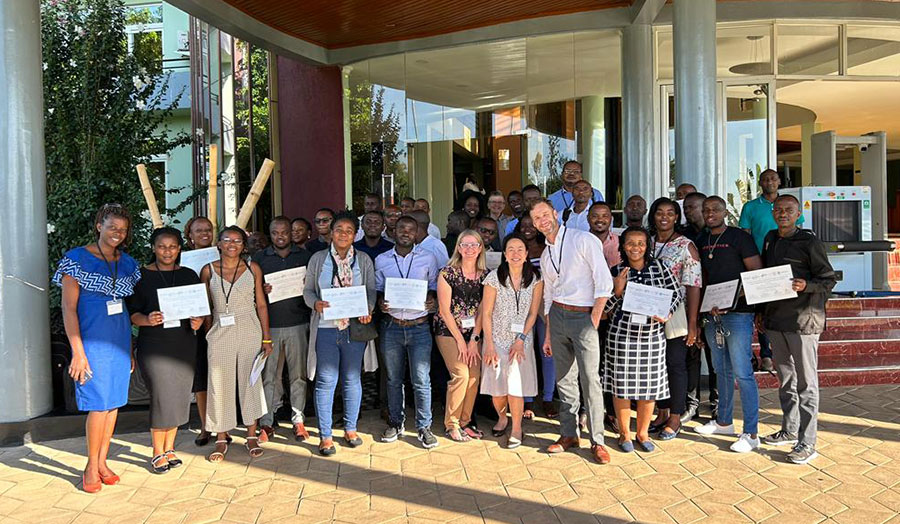Canadian Blood Services supporting global efforts in Transfusion Medicine education

Blood is listed on the World Health Organization List of Essential Medicines. It is lifesaving and prescribed by physicians in every country in the world. Yet, health care providers in many of these countries do not have access to critical education content needed to ensure that they deliver the most evidence-based patient blood management. This gap in evidence-based education can negatively impact patient safety and outcomes regardless of the hemovigilance and operational practices of laboratories and blood services organizations.
Transfusion Camp, a teaching curriculum employing interactive educational methods, has demonstrated improvements in trainee transfusion medicine knowledge and self-reported confidence in managing transfusion medicine related problems in clinical care and has been taught in Canada since 2012. With the support of Canadian Blood Services as the coordinator, all Canadian universities along with institutions in the United Kingdom have access to this program. It ensures that the most up-to-date practices are successfully disseminated to the physicians who transfuse the patients in our hospitals every day.

How the Rwanda Transfusion Camp began
In January 2020 Drs. Yulia Lin, Jacob Pendergrast (two of the founding educators of Transfusion Camp), and Teresa Skelton first met to discuss the possibility of expanding the Transfusion Camp curriculum and education theory to resource-limited settings. Dr. Skelton had experience in teaching low-cost simulation in countries such as Rwanda through the Vital Anesthesia Simulation Training (VAST) program, with a goal to ensure that practitioners received critical anesthesia safety training that bypassed barriers to access and cost and narrowed the gap in education between low and high resource settings. Why couldn’t patient blood management education improve from similar knowledge translation strategies?
Three years later, surmounting challenges including the COVID-19 pandemic, time zone differences and internet connectivity barriers, a multilateral collaboration has been developed between Canadian Blood Services, The Rwanda Biomedical Centre – Blood Transfusion Division, The University of Toronto, The University Teaching Hospital of Kigali, and The University of Rwanda – Department of Anesthesia and Critical Care. The strength of this partnership is a result of the devotion to improving blood transfusion safety in Rwanda by local faculty: Dr. Thomas Muyombo (Blood Transfusion Division Manager), Dr. Christopher Gashaija (Director of Kigali Regional Center for Blood Transfusion), Dr. Francoise Nizeyimana (Program Director for the Department of Anesthesia and Critical Care), Dr. Aimable Kanyamuhunga (Head of the Department of Pediatrics – The University Teaching Hospital of Kigali) and Dr. Florence Masaisa (Head of Clinical Education at University Teaching Hospital of Kigali and Chair of Internal Medicine department at the University of Rwanda) along with many other teaching faculty and quality assurance staff including Fabrice Ndicunguye from Rwanda Biomedical Centre – Blood Transfusion Division. A pre-existing Memorandum of Understanding between the University Teaching Hospital of Kigali and the Rwanda Biomedical Centre helped align the team toward common transfusion medicine education objectives and supported the provision of continuing professional development credits for the course.
A successful educational experience
In May 2023, 51 physicians and laboratory technicians from across all five provinces in Rwanda participated in-person in a 2-day Transfusion Camp Train-the-Trainer workshop. They traveled from tertiary referral hospitals, level II teaching hospitals, provincial hospitals, district hospitals and rural health centres, with some locations as far as an 8-hour drive away. Transfusion Camp content was taught primarily by Rwandan faculty with support from Dr. Jacob Pendergrast and Dr. Yulia Lin from University Health Network and Sunnybrook Health Sciences Centre, respectively. Dr. Teresa Skelton from the Department of Pediatric Anesthesia at BC Children’s Hospital guided the train-the-trainer content on team-based learning. Small group conference proceedings led by Rwandan faculty enabled sharing of barriers to safe transfusion practices in Rwanda and the development of a joint strategy on patient blood management engagement, continuing medical education and research.
Logistics of this course were supported by the Rwanda Biomedical Centre through the Blood Transfusion Division and shared nationally on Rwanda Biomedical Centre platforms.
Zipline Rwanda, a drone technology company tasked with delivering blood products and other medicines throughout Rwanda, supported the camp through educational lectures and information booths on how their drones operate and what participants can do to better engage with the technology.
Further successes in the Canada-Rwanda Transfusion Camp partnership have included the delivery of a multidisciplinary Rwandan medical trainee Transfusion Camp course in 2022 (https://doi.org/10.1111/trf.17531), funding support for the Train-the-Trainer course from the International Society of Blood Transfusion, and the development of new initiatives including education for graduating medical students and partnerships with neighboring countries interested in adopting the Transfusion Camp curriculum.
We challenge the readers of this blog to consider what education curricula, continuing medical education opportunities, and access to publications, technology, and teachers we all take for granted in transfusion medicine and beyond every day. How can we endeavor to improve access and engagement with evidence-based transfusion medicine education in a way that is sustainable, driven by the local medical community, and ensures faculty in resource-limited settings are benefiting through academic achievement and promotion, all while considering the stress on the limited health human resources likely present in many countries.
Canadian Transfusion Camp faculty challenge the evidence-based education gap also present in our own setting through engagement with universities, rural partners and nurse practitioners and are commended on the access to education and to patient blood management safety this provides across Canada. Sharing this program with the world has the potential to foster long-lasting bilateral knowledge translation and increase blood transfusion safety for millions of patients.
Canadian Blood Services – Driving world-class innovation
Through discovery, development and applied research, Canadian Blood Services drives world-class innovation in blood transfusion, cellular therapy and transplantation—bringing clarity and insight to an increasingly complex healthcare future. Our dedicated research team and extended network of partners engage in exploratory and applied research to create new knowledge, inform and enhance best practices, contribute to the development of new services and technologies, and build capacity through training and collaboration. Find out more about our research impact.
The opinions reflected in this post are those of the author and do not necessarily reflect the opinions of Canadian Blood Services nor do they reflect the views of Health Canada or any other funding agency.